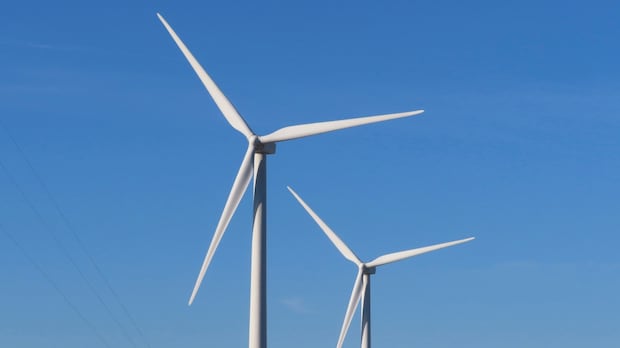Donald Trump's disdain for wind energy could create windfall for Nova Scotia: experts
N.S. premier's Wind West plan calls for selling excess power to Canada, U.S.

U.S. President Donald Trump's opposition to renewable energy could create a "golden opportunity" for Nova Scotia's fledgling offshore wind energy industry, a leading international consulting firm says.
Aegir Insights, based in Denmark, recently presented a webinar that examined Premier Tim Houston's 10-year plan to license enough offshore turbines to produce 40 gigawatts of electricity.
Even though the province requires only 2.4 GW, Houston's Wind West plan calls for selling excess power to the rest of Canada and, potentially, the United States.
Experts say such a project would require construction of about 4,000 offshore turbines that would generate as much electricity as China's offshore turbines produced last year.
Scott Urquhart, co-founder and CEO of Aegir Insights, said Wind West has grabbed the attention of the global offshore wind industry.
"The vision is to get Nova Scotia on the radar of big international investors," Urquhart said Tuesday in an interview from Copenhagen. "If the big players saw only a one-gigawatt ambition, they won't show up."
During last week's webinar, which attracted about 100 project developers, investors and government officials, Urquhart described Wind West as "grand and ambitious," but said it is underpinned by "rational market fundamentals and economics."

Founded in 2020, Aegir Insights describes itself as an intelligence provider that offers analytics and models for those investing in the offshore wind sector. Its database of projects spans 60 markets. Though he is based in Copenhagen, Urquhart has taken a keen interest in Wind West, having grown up in Cape Breton.
He told the webinar that the offshore wind industry has been hurt by rising costs and supply chain issues in recent years, but he said the industry appears poised for a recovery as interest rates fall and supply chain competition heats up.
Signe Sorensen, Aegir's regional lead in the Americas, said these encouraging trends have been overshadowed in the United States by Trump's decision to place a hold on offshore projects that have already received permits.
"Even as the global sector looks to be on the road to recovery, the U.S. is on a completely different path," Sorensen told the webinar. "And that matters a lot to Canada. One state's challenge could be another state's opportunity."
In January, Trump announced he would halt leasing for wind projects while fast-tracking plans for more oil and gas production. That move has led to layoffs and stalled construction of wind turbines, which account for 10 per cent of U.S. electricity production — the largest source of renewable energy.
Earlier this month, Trump doubled down on his opposition to wind power.
"The windmills are killing our country," he said on June 12. "The fields are littered with them — junk .... It's the greatest scam in history, the most expensive energy you can buy."
Sorensen said the New England states and New York have been leading development of the offshore wind sector in the U.S., but Trump's opposition could stall the industry for the next four years.
"They need to find renewable sources to supply this energy," Sorensen said. "That's where large-scale Canadian wind could come into the picture, specifically Wind West .... There's a golden opportunity in this for Canada."
Urquhart agreed.
"On the U.S. side, you just had a hole blown in the offshore wind sector and you have a whole bunch of supply chain people and developers who are standing around saying, 'Oh, no,'" he said in an interview. "Now is the time to put your visionary ideas out. If you were to wait on something like this, you'll miss a window of opportunity."
During his online presentation, Urquhart showed a colour-coded "heat map" highlighting areas off Nova Scotia's coast where offshore wind development would be feasible.
"There are huge areas that could do tens-of-gigawatts of offshore wind," he said, pointing to the sprawling, shallow banks around Sable Island and a long stretch closer to Nova Scotia's southern shoreline. "There are several highly prospective locations."
As well, Sorensen pointed to charts showing the New England states and New York are willing to pay top dollar for offshore wind energy.
"Nova Scotia could be competitive, pricewise," she said.

